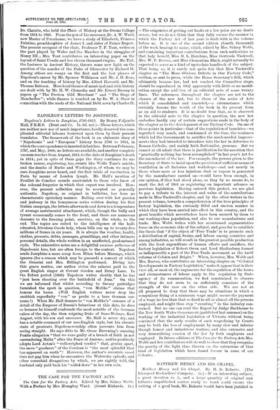NAPOLEON'S LETTERS TO JOSEPHINE.
Napoleon's Letters to Josephine, 1796-1812. By Henry Foljambe Hall, F.R.H.S. (Dent and Co. 7s. 6d. net.)—These letters, which are neither new nor of much importance, hardly deserved the com- plicated editorial labours bestowed upon them by their present translator. The framework of the book is an elaborate diary of " Napoleonic " and " European" history from 1796 to 1814, in which the correspondence is inserted in batches. Between February, 1797, and May, 1800, no letters are available, and another complete vacuum reaches from August, 1811, to the date of Josephine's death in 1814; yet in spite of these gaps the diary continues its un- broken course, registering, too, events like Wolfe Tone's suicide, and the deaths of Burke and Washington, of whom wo may be sure Josephine never heard, and the first trials of vaccination in Paris by means of London lymph. Mr. Hall's mention of Feuillet de Conches sounds amateurish to those who know of the colossal forgeries in which that expert was involved. How- ever, the present collection may be accepted as generally authentic. Napoleon, so original in bulletins, has here no characteristic epistolary manner. Boiling over with hot passion and jealousy in the honeymoon series written during his first Italian campaign, the letters afterwards cool down to a temperature of average matrimonial attachment, which, though the bully and tyrant occasionally comes to the front, and there are numerous descents to the freezing point, survives, on the whole, to the end. The topics are suited to the intelligence of the half- educated, frivolous Creole lady, whose bills ran up to twenty-five millions of francs in six years. It is always the weather, health, clothes, presents, debts, messages, grumblings, and other intimate personal details, the whole written in an unaffected, good-natured style. The exhaustive notes are a delightful oniniuna gatherunt of Napoleonic lore, but are often foreign to the context. Napoleon sends Josephine a mere scrap from Milan before Marengo, which ignores (for a reason which may be guessed) a concert at which the Grasaini and Mrs. Billington performed. Diving into this grave matter, our author states the salaries paid to the great English singer at Covent Garden and Drury Lane. In the Erfurt period (1808) Napoleon writes shortly that he has "just been shooting over the battlefield of Jena." On this we are informed that whilst according to Savory partridges furnished the sport in question, "von Moltke " claims that honour for hares. (Will English writers never drop the snobbish superfluity " von" as prefix to a bare German sur- name ?) When Mr. Hall demurs to " von Moltke's" censure of a detail of the Emperor of Russia's behaviour at this date, he does so because he himself confounds the most notable of the German rulers of the day, the then reigning Duke of Saxe-Weimar, Karl August, with his son and successor. Mr. Hall is never dry, and has a notable command of our neo-English style, but his chronic state of prostrate Napoleon-worship often prevents him from seeing straight. He says ditto to Mr. Oscar Browning's amazing Foxite allegation "that we were guilty of a breach of faith in not surrendering Malta" after the Peace of Amiens ; and he positively adopts Lord Acton's " well-weighed verdict" that, genius apart, the mere "goodness" of the Corsican is "the most splendid that has appeared on earth" ! However, the author's eccentric creed does not gag him when he encounters the Walewska, episode, and other connubial divagations by which, we are rightly told, the husband only paid back his "soiled dove" in her own coin.


















































 Previous page
Previous page